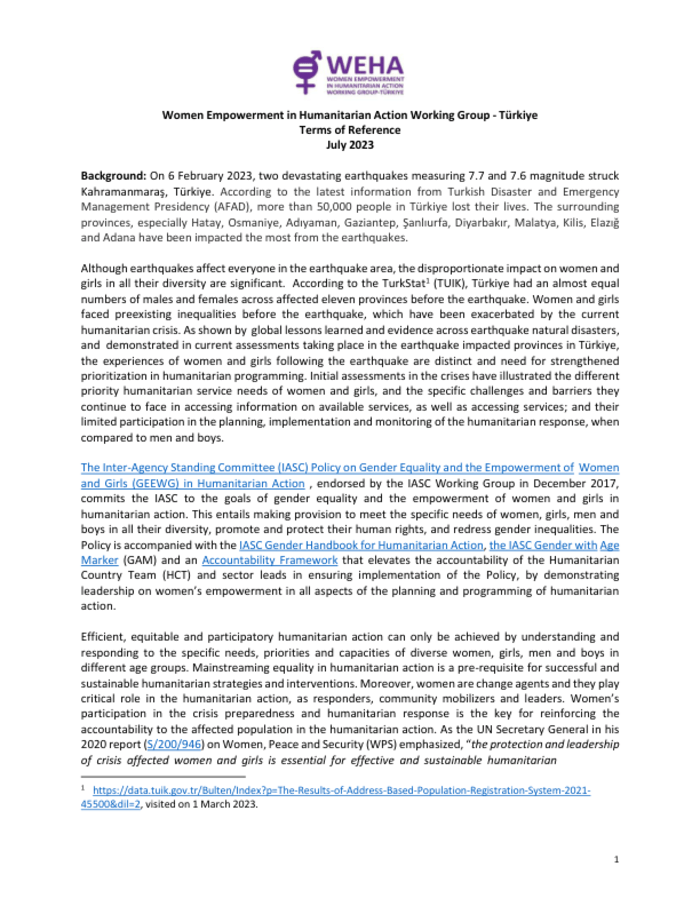

Background: On February 6, 2023, two devastating earthquakes measuring 7.7 and 7.6 on the Richter scale struck Kahramanmaras, Turkey. According to the latest information from the Turkish Disaster and Emergency Management Authority (AFAD), more than 50,000 people lost their lives in Turkey. The surrounding provinces were the most affected by the earthquakes, especially Hatay, Osmaniye, Adıyaman, Gaziantep, Şanlıurfa, Diyarbakir, Malatya, Kilis, Elazig, and Adana.
While the earthquake affects everyone in the affected areas, its disproportionate impact on women and girls is significant in its diversity. According to TurkStat1 (TUIK), before the earthquake, Turkey had an almost equal number of men and women in the 11 affected provinces. Women and girls faced inequalities even before the earthquake, which have been exacerbated by the current humanitarian crisis. As demonstrated by global lessons and evidence gained throughout the earthquake natural disaster and ongoing assessments in the earthquake-affected provinces of Turkey, women and girls’ experiences after the earthquake are unique and require enhanced prioritization in humanitarian planning. Initial assessments in the crisis revealed different priority humanitarian service needs for women and girls, specific challenges and barriers they continue to face in information about and access to available services, and limited participation in planning, implementing, and monitoring the humanitarian response compared to men and boys.
The Inter-Agency Standing Committee (IASC) Policy on Gender Equality and Empowerment of Women and Girls in Humanitarian Action, approved by the IASC Working Group in December 2017, commits the IASC to the goals of gender equality and empowerment of women and girls in humanitarian action. This includes making provisions to meet the specific needs of women, girls, men and boys in all their diversity, promote and protect their human rights and redress gender inequalities. The policy is accompanied by the IASC Gender Handbook for Humanitarian Action, IASC Age-Specific Gender Markers (GAMs) and an Accountability Framework to increase the accountability of Humanitarian Country Teams (HCTs) and sector leaders to ensure the implementation of the policy through leadership on women’s empowerment in all aspects of humanitarian planning and programming.
Efficient, equitable and participatory humanitarian action can only be achieved by understanding and responding to the specific needs, priorities and capacities of diverse women, girls, men and boys across different age groups. Mainstreaming equality in humanitarian action is a prerequisite for successful and sustainable humanitarian strategies and interventions. Moreover, women are agents of change and play a critical role in humanitarian action as responders, community mobilizers and leaders. Women’s participation in crisis preparedness and humanitarian action is key to strengthening accountability to affected people in humanitarian action. As the UN Secretary-General highlighted in his 2020 Women, Peace and Security (WPS) Report (S/200/946), “the protection and leadership of women and girls affected by crises are essential for effective and sustainable humanitarian action, and when women are meaningfully engaged and their needs are directly addressed, humanitarian action is more efficient and effective, the transition to recovery is accelerated and communities as a whole are more resilient.”
Tara Thomas Agency stands at the forefront of the entertainment industry, with years of experience dedicated to nurturing the most exceptional talents and successful acts.